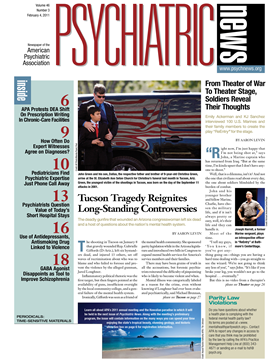Do expert witnesses' adversarial roles in criminal cases influence their conclusions about a defendant's psychiatric diagnosis?
Matthew Large, M.D., a conjoint senior lecturer at the University of New South Wales in Australia, and colleagues thought the answer would be yes. Their hypothesis, however, turned out to be wrong.
They examined 270 reports provided to courts by expert witnesses concerning 110 criminal cases concluded from 2005 to 2007. In each of these cases, at least one report from an expert engaged by the prosecution and at least one from an expert engaged by the defense were available. The reports were provided by the Office of the Director of Public Prosecutions in New South Wales, Australia. All of the cases involved serious offenses, such as fraud, kidnapping, arson, physical assault, sexual assault, and murder.
In each of these reports, a DSM-IV psychiatric disorder was recorded or a statement that no mental disorder was present was recorded. Large and his colleagues looked to see whether expert witnesses representing the two sides in each case tended to agree or disagree on a psychiatric diagnosis. In most cases they agreed.
Thus “concern about bias in expert psychiatric opinion in criminal cases appears to have been overstated,” the researchers wrote in the winter 2010 issue of the Journal of the American Academy of Psychiatry and the Law. “There was little evidence to suggest that experts' adversarial roles influenced their opinions on psychiatric diagnosis.”
The researchers also examined the 270 reports provided by expert witnesses to see whether psychiatric diagnoses provided by psychiatrists tended to agree with those provided by psychologists, or vice versa. (Out of the 270 reports, 226 had been written by 30 psychiatrists, and 44 by 15 psychologists.) The researchers expected experts from the same profession to agree more often on diagnoses than experts from different professions. But once again, they were surprised: Report pairs written by a psychiatrist and a psychologist were as likely to agree on a diagnosis as report pairs written by two psychiatrists.
Regarding the diagnosis of various types of mental disorders, however, expert agreement varied considerably. Whereas there was good or very good inter-rater agreement on the diagnoses of acquired brain injury, schizophrenia-spectrum psychosis, and substance-induced psychotic disorder, and moderate agreement on depressive disorders and personality disorders, concurrence on anxiety disorders—especially on posttraumatic stress disorder (PTSD)—was poor.
The reason why agreement on PTSD was particularly lacking, the researchers speculated, was either because PTSD “was not relevant to criminal proceedings, or because it is difficult, with the current diagnostic criteria, to make the diagnosis in a reliable way in legal settings.”
If a study similar to the Australian one were conducted in the United States, the findings would probably be similar, Large told Psychiatric News, since forensic experts in Australia are trained and employed in a manner similar to those in the United States. “But since our study appears to be the only one of its kind, we can't be absolutely sure.”
In a previous study, published in the winter 2008 Journal of the American Academy of Psychiatry and the Law, Large and his colleagues had examined levels of agreement among expert witnesses in civil cases (motor vehicle accidents). They found that experts' diagnoses generally favored the side that engaged them and that experts engaged by the same side were significantly more likely to agree on a psychiatric disorder than experts engaged by the opposite side.
One possible explanation for the discrepancy between these findings and those from their criminal case study, Large and colleagues suggested, is that the experts tapped in their criminal case study tended to be forensic psychiatrists in clinical practice who had provided testimony for both the prosecution and the defense, whereas the experts tapped in their civil case study were often retired forensic psychiatrists who had become full-time witnesses for an insurance company or a firm specializing in personal injury.
Another possible explanation for the discrepancy, the researchers noted, is that many of the defendants in the criminal cases they studied had severe, disabling schizophrenia, which is fairly easy to diagnose and thus not likely to be a point of contention among expert witnesses. In contrast, many of the defendants in the civil cases they studied had PTSD or other anxiety disorders, which are harder to diagnose than schizophrenia and thus more likely to be a point of dispute among expert witnesses.
The study had no outside funding.
